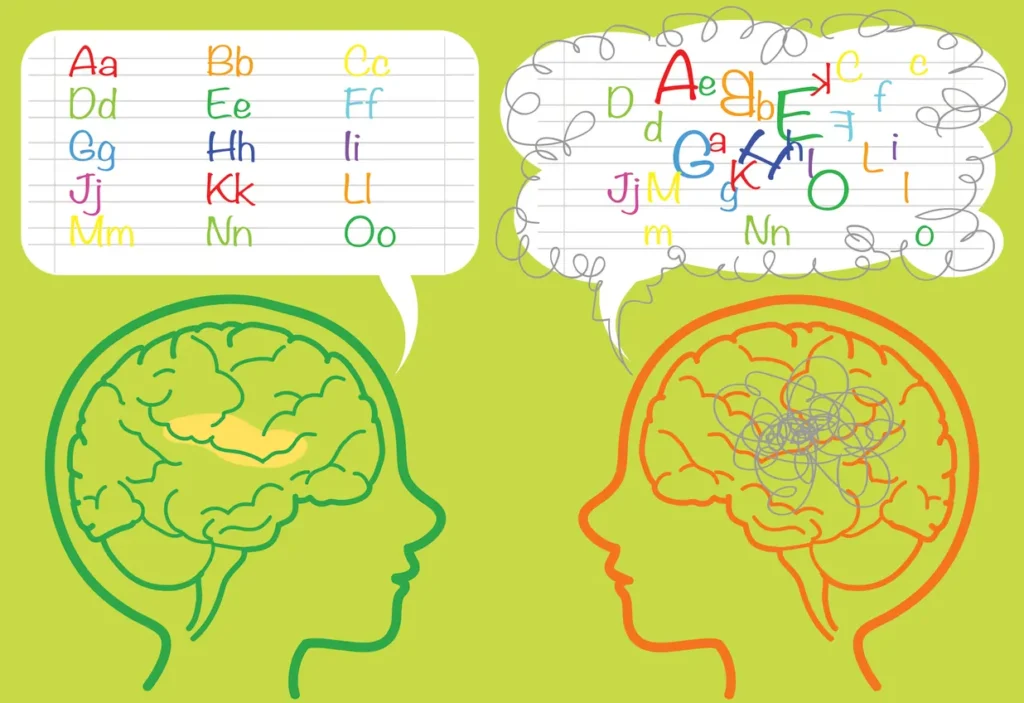By: Matthew Wallace

Story at-a-glance
- Learning disabilities affect how people understand and use information, impacting reading, writing, math, and communication.
- They begin in childhood and last into adulthood, often misunderstood or undiagnosed for years.
- Children may show early signs like struggling with the alphabet, using scissors, or reading words.
- Adults with learning disabilities often face work, self-esteem, and emotional challenges, but many find ways to adapt and thrive.
- Support, early detection, and the right resources help children and adults succeed at school, work, and in life.
When a person has a learning disability, he or she has difficulty receiving, processing and responding to new information. This affects their ability to learn skills like writing, reading, math, and speaking. As a result, this impacts how a child performs in school and throughout life. Although someone with a learning disability has difficulty learning, he or she will often possess intelligence that is average or higher than average. Unfortunately, learning disabilities do not fade over time and oftentimes stays with the child when they reach adulthood. People should not mistake a learning disorder for disabilities with conditions such as attention deficit disorder (ADD), or attention deficit-hyperactivity disorder (ADHD), which is often accompanied by a learning disorder. Identifying the different types of learning disabilities will help people take the necessary steps in getting the help they need.
Learning Disabilities in Children
Indications that a child has a learning disability or down’s syndrome may appear when they are toddlers or in preschool. Learning disabilities manifest differently from one child to another, which makes it more difficult to identify.
Common signs that a child has a learning disability may be difficulty learning the alphabet, identifying colors, and understanding numbers. They might have a hard time reading and pronouncing words. They may struggle with vocabulary words and are confused with the meaning of words.
A child might also have trouble performing tasks such as using scissors, drawing, painting, tying shoes, or coloring within the lines.
As children grow older, learning disabilities may transform into dislikes such as difficulty with reading comprehension or solving math problems. Students might have a hard time following discussions in the classroom.
Early detection will make it easier for children to begin to develop the skills needed to cope with their disability and improve their chances of success.
- Helpguide: Learning Disabilities in Children
- Learning Disorders
- American Academy of Child and Adolescent Psychiatry: Children With Learning Disabilities
- Council for Exceptional Children: The Warning Signs of Learning Disabilities
- TeensHealth: Understanding Dyslexia
- NICHCY: Learning Disabilities – Disability Factsheet (PDF)
- Detecting Learning Disabilities WebMD
- CDC: Quickstats – Percentage of Children Aged 5 – 17 Years Receiving a Diagnosis of a Learning Disability
- Introduction to Learning Disabilities
Learning Disabilities in Adults
Learning disabilities are not just a problem that affects school aged children. These disabilities follow a person into their lives as an adult and can play a major role in their professional and personal successes and failures. Some adults may mistakenly believe that their learning disabilities are tied directly to their education or bad encounters they’ve experienced with family. In some instances, someone may not know he or she has a learning disability until later, either in college or in a work environment situation. Although most cases of learning disabilities are found during childhood, some cases may be minor or undetected. A child may attempt and even succeed at disguising their disability. For example, dyslexia is common learning disability that frequently goes undetected.
An undiagnosed adult often suffers from secondary characteristics that arise from coping with their disability. These characteristics are often emotional and involve negative feelings of defeat, low self-esteem, and depression. On the plus side, adults who have been aware of their disability since childhood may have developed methods to help them adapt to learning. Despite the difficulties they might have, these people can be highly motivated to succeed. To effectively cope with their disability, adults must recognize what their weaknesses are and take the appropriate actions to work around them.
- Characteristics of Adults With Specific Learning Disabilities
- Learning Rx: Adult Learning Disabilities
- Learning Disabilities Worldwide: Just for Adults – Understanding Your Learning Disability
- Diagnosing Learning Disabilities (PDF)
- Adults with Learning Disabilities – An Overview
- Emotional Problems in Adults with Learning Disabilities
- Florida’s Focus on Adults with Learning Disabilities (PDF)
- How Do You Get Tested For LD?
Types of Learning Disabilities
Learning disabilities fall into four major categories: verbal and written languages, arithmetic and reasoning. Disabilities related to verbal and written languages can affect a child’s ability to read, spell, and write; they’re listening skills might be compromised.
Another way of classifying learning disabilities is by categorizing them under input, integration, memory, and output. Input disabilities deals with issues of sensory perception. Dyslexia is an example of an input-based disability, which causes a person’s mind to mix up numbers, letters, and words. Integration-based disabilities involve a person’s ability to organize data or they lack reading comprehension. Memory disabilities are identified when a child has a problem recollecting. Disabilities that pertain to output are present when a person has speech impediments or they have trouble with motor skills like handwriting.
- What are Specific Types of Learning Disabilities
- Disability Services Office – Learning Disabilities
- University of Connecticut: Five Common Types of Learning Disabilities
- Adelphi University Libraries: Learning Disabilities – What are the Specific Types
- Mass.gov Health and Human Services: Types of Learning Disabilities
- National Institute of Health Eunice Kennedy Shriver: Learning Disorders – What are Some Types of Learning Disabilities
- PBS: Types of Learning Disabilities
- What are Nonverbal Learning Disabilities?
- Girls Health: Common Types of Learning Disabilities
Challenges
Although challenges differ according to the individual, learning disabilities have a profound effect on how a person progresses in life in terms of education, career, personal life, and their overall well-being.
The more severe a child’s learning disabilities are the more attention and special education they will need. If the disability is not recognized or addressed by a parent, counselor, or teacher, this may result in the child experiencing bullying from other students in school. Children with learning disabilities may be more introverted and less likely to make friends.
A professional with learning disabilities may not work as productively, especially in high-paced stressful environments where organization and multi-tasking are critical.
- Briefing Paper, “Bullying and Students with Disabilities” (PDF)
- Online Safety for Children with LD
- Barriers and Solutions in the Workplace: Part II People with a Learning Disability – Barriers to Getting and Keeping Work (PDF)
- National Collaborative on Workforce and Disability – Helping Youth with Learning Disabilities Chart the Course: A Guide for Youth Service Professionals
- ADDitude Magazine: ADHD and LD Adults at Work: Seven Accommodations to Help Harness Your Inner Executive
- Job Accommodation Network: Accommodation and Compliance Series: Employees with Learning Disabilities
- Mayo Clinic: Dyslexia Complications
Help and Resources
Adults and children face a great deal of frustration and stress coping with their learning disability. There are resources available for both adults and parents of children with learning disabilities. Organizations like National Center for Learning Disabilities, Learning Disabilities Association of America, Smart Kids With Learning Disabilities, Learning Disabilities Association of Wisconsin, and the United Way can help people not only cope, but also adapt to their situations.
- National Center for Learning Disabilities
- Learning Disabilities Association of America
- Smart Kids With Learning Disabilities
- Learning Disabilities Association of Wisconsin
- USA Today: College Bound Kids With Learning Disabilities Get Help
- Americans With Disabilities Act Homepage
- Adults & Children With Learning and Developmental Disabilities, Inc.
- United Way Connecticut: Help for Adults with Learning Disabilities
FAQs
What is a learning disability?
A learning disability makes it harder for a person to understand, remember, or respond to information. It can affect reading, writing, math, and speaking skills.
How do learning disabilities show up in children?
Kids may struggle with reading, writing, understanding numbers, or using scissors. As they grow, they may have trouble in school and social settings.
Do learning disabilities go away over time?
No, learning disabilities stay with a person into adulthood. With support and tools, people can learn how to manage them.
Can adults have learning disabilities too?
Yes. Many adults still deal with learning disabilities, even if they weren’t diagnosed as kids. They may struggle at work or with self-confidence.
What are the types of learning disabilities?
They include issues with reading (like dyslexia), writing, math, memory, and motor skills. Some affect how we take in or give out information.
Where can families find help?
Groups like the National Center for Learning Disabilities and Learning Disabilities Association of America offer support and resources for kids and adults.
Ready to protect your future?
Get a personalized side-by-side policy comparison of the leading disability insurance companies from an independent insurance broker.




